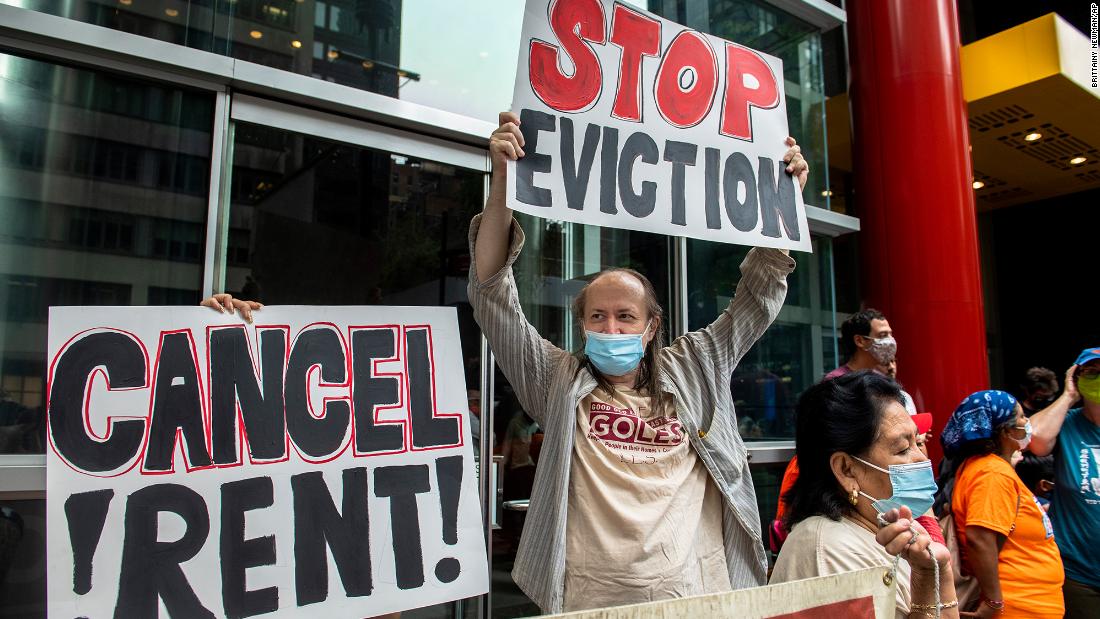Biden: CDC to Propose Eviction Strategy 0:54
(CNN) -
This weekend, after the nearly one-year ban on evictions expired, Ronald Leonard was terrified of being kicked out of his rental home in Daytona Beach, Florida.
But then, on Tuesday night, he heard that the eviction moratorium had been extended again.
"I'm the happiest guy in the world," Leonard said.
Like millions of other tenants at risk of losing their homes without the federal eviction ban, Leonard said he was devastated Monday and Tuesday, waiting in fear for a sheriff to come to his door after the moratorium expired on July 31.
"If I end up on the street, I will never survive," Leonard, 68, said at the time.
With an eviction complaint filed against him in April, the moratorium, established by the Centers for Disease Control and Prevention (CDC) last September, was all that kept him at home.
Leonard has a pending application for part of the $ 46 billion in federal rent relief that has been set aside.
He hoped the help would come to him in time to pay the back rent of nearly $ 6,000.
But the money did not arrive before the first eviction ban ended.
advertising
"I bit my nails until they bled," Leonard said of the days when he wasn't protected.
"I was nervous waiting for the sheriff to ring."
The Biden administration's extension of the eviction moratorium in areas with high rates of coronavirus transmission, including where Leonard lives in Florida, will completely change his life, he said.
ANALYSIS |
Biden shows that he is ready to take drastic measures in the fight against covid-19, even if he is not sure they are legal
The extension will allow time for your landlord to receive rental assistance money and will secure you an income-based retirement home in which you can afford to live on your fixed income.
"I'm going to focus on the blessing of having a roof over my head a little bit more," he said.
"We are millions. My heart no longer bleeds for single mothers and people with young children who have to do their best to avoid being evicted. They too are protected."
Who is protected now?
Unlike the previous ban, the new protection will be more limited and will target the areas most affected by the coronavirus.
It will protect those in areas of the country with "high" or "substantial" transmission of COVID-19 based on CDC tracking of the virus and will last until October 3.
As of August 1, more than 80% of US counties were classified as having "substantial" or "high" levels of community transmission.
Biden's management said those areas include 90% of tenants.
Areas with lower transmission rates, including parts of Minnesota, Michigan, Maine, and Vermont, are not covered.
But the protection is based on the county.
Renters can search for their county on the CDC website to see if they are covered by this new ban.
According to the order, if a county that is not covered on August 3 becomes an area with "substantial" or "high" levels of community transmission before the order expires, that area is covered on the day that the county begins to experience those higher levels of transmission.
On the other hand, currently covered counties will exit the order's eviction protection once the county no longer has "substantial" or "high" transmission levels for 14 consecutive days.
To be protected by the ban, an eligible tenant must provide a written statement to the landlord.
Any tenant who has previously filed a return will continue to be covered, according to the new order.
But any eviction that was completed while the previous protection expired, on August 1, 2 or 3, is not covered, as the order does not operate retroactively.
They raise more than US $ 170,000 in 24 hours for a mother and her three daughters who are facing eviction
The clock has been reset
Housing advocates applauded the CDC's renewed moratorium and expressed hope that state and local governments can accelerate the distribution of rental assistance before October.
"This is a great relief to millions of people who were on the verge of losing their homes and, with them, their ability to stay safe during the pandemic," said Diane Yentel, president and CEO of the National Housing Coalition for Individuals. Low income.
With a small fraction of the $ 46 billion in emergency rental assistance already distributed, and many programs now in place, there is a race to get this money to those in need by October to keep tenants housed and give them the money to the owners.
"Now, the work of state and local governments to distribute emergency rental assistance to tenants who need it becomes even more critical. The president has given them the time they and millions of tenants needed - they must use it effectively. and streamline attendance, "Yentel said.
"The country is watching, and tenants and landlords are waiting."
The owners are frustrated
Meanwhile, homeowner groups are frustrated.
They expressed shock at the radical change after the administration said it likely did not have the authority to extend the moratorium.
"Is it possible that the federal government creates more uncertainty for renters and rental homeowners in this country?" Asked David Howard, executive director of the National Rental Home Council, an industry group of homeowners.
"I am ashamed to assume that the moratorium would not be extended after the president announced that he has no legal authority to do so, nor that Congress was able to pass legislation to do so. Meanwhile, rental homeowners have lost billions. dollars they will never get back, "he said.
Legal challenges to the new order are expected.
In multiple lawsuits across the country, the New Civil Liberties Alliance, an organization that aims to protect constitutional freedoms, argues that the eviction moratorium exceeds the constitutional and statutory limits of CDC authority.
CDC Announces Limited, Selective Eviction Moratorium Until Early October
Last month, the US Court of Appeals for the Eleventh Circuit rejected a request to end the eviction moratorium issued by the CDC.
NCLA said it is now considering whether to appeal this decision to the United States Supreme Court or return to district court for trial.
"This is not how government should work, much less how 'laws' are written," said Caleb Kruckenberg, trial attorney for the NCLA.
"If the CDC goes ahead, the courts must quickly shut down the agency's illegal actions."
For attorneys working on behalf of panicked tenants, the news of the extension is welcome.
But, they say, the new order will likely prove confusing for judges, attorneys, tenants and landlords who are already beset by changing regulations, advanced court cases, and varying levels of protection across the country.
The key will be making sure there is clarity on where the order applies, said Caitlin Cedfeldt, a staff attorney for Legal Aid of Nebraska, and that it is known to tenants and defense attorneys.
"But any kind of limitation on evictions is a good thing now," Cedfeldt said.
"It will give my clients the time they need to process their rental assistance."
If you are looking for emergency rental assistance, there is a searchable list of programs available from the US Treasury and also lists administered by the National Low Income Housing Coalition and the National Housing Conference.
evictions






